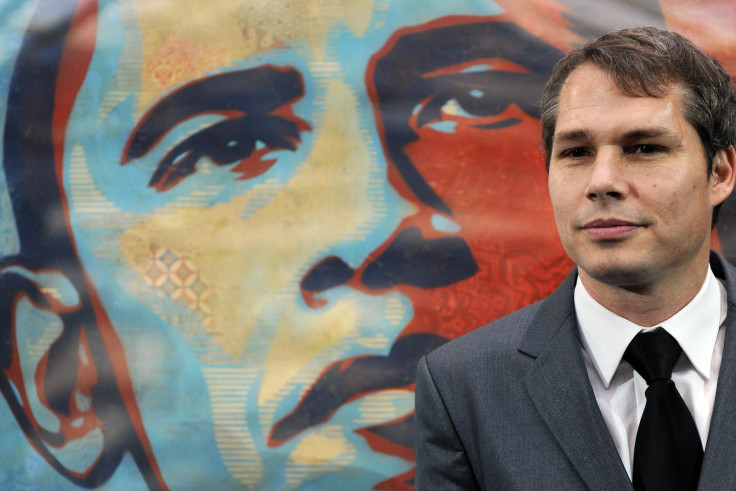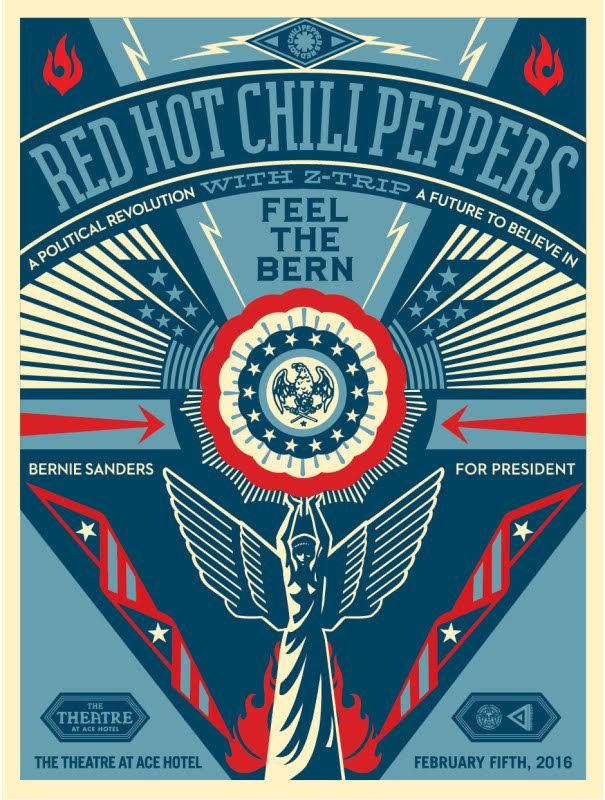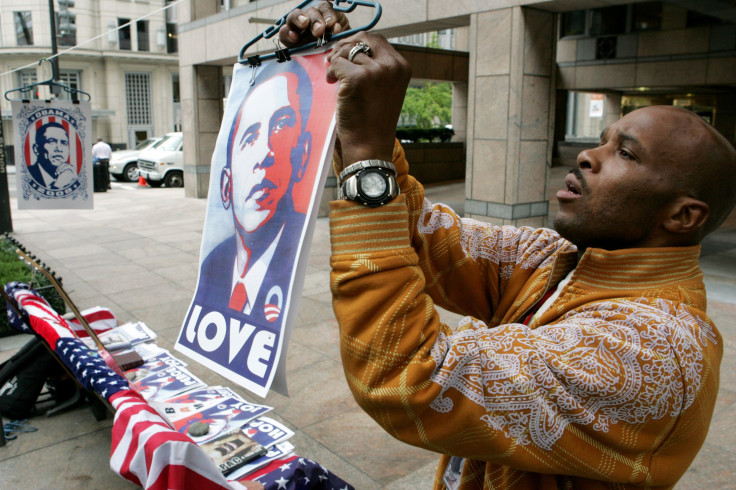Shepard Fairey Endorses Bernie Sanders: Obama ‘Hope’ Poster Artist Wants Campaign Finance Reform

Soon after artist Shepard Fairey screen printed 700 posters of then-Sen. Barack Obama in four colors in 2008, the image went viral and ultimately became one of the most recognizable symbols of the next president. The message was clear: The Illinois senator was cool, progressive and a tantalizing prospect for real change in an American political system that had been bogged down for years by foreign wars.
Political pundits have been quick to draw comparisons between that 2008 campaign and Vermont Sen. Bernie Sanders’ insurgent presidential bid in 2016. Like Obama eight years ago, Sanders energizes young voters with cult-like devotion, has a wildly successful grassroots organization and packs stadiums with screaming fans. But, after years of growing frustration with the president for attempting compromise without getting results on issues like curbing the overt influence of money in politics, Fairey is no longer solidly in Obama's corner. Sanders — a persistent proponent of campaign finance reform — is now his champion.
“Even though I agreed with almost all of Obama’s proposed policies as a campaigner … I was disappointed in his approach to fundraising. However, I recognized his pragmatism when Hillary Clinton was taking contributions from moneyed interests and so were the Republicans,” Fairey, 45, who officially endorsed Sanders last month, said in an email interview this week. “Sanders will be different because he is already different. He’s not accepting corporate donations or allowing the creation of super PACs.”

Sanders has made campaign finance reform a central part of his campaign, drawing scrutiny to former Secretary of State Hillary Clinton’s embrace of super PACs. Super PACs legally cannot coordinate with the campaigns themselves, but often are run by longtime allies of the candidates and are legally allowed to raise unlimited sums of money to spend on things like political advertising.
Clinton and her affiliated super PACs have raised millions from the financial industry and other special interest groups — as did Obama — while much of Sanders’ surprisingly robust fundraising has come from small dollar donors.
The two candidates engaged in a sharp debate on campaign finance Thursday during the Democratic debate in New Hampshire. Clinton, answering a question about the hundreds of thousands of dollars in speaking fees and campaign contributions she has received from Wall Street, challenged the audience to name one vote on which she was influenced by moneyed interests.
The Sanders campaign was quick to blast a fact check email out to reporters that said Massachusetts Sen. Elizabeth Warren, who is well known for her tough stance on banks, "can certainly name at least one thing" on which Clinton was influenced. In 2001, Clinton voted on a bill that would make it more difficult for people to erase personal debt through bankruptcy, a vote that was in line with millions in lobbying expenditures from the banking industry. Warren noted in 2003 Clinton's support was a complete reversal of her position while first lady of the United States, and the main thing that had changed was that Clinton in 2001 was reliant on campaign contributions from banks to fund her Senate campaigns.
"Only Hillary Clinton knows whether she’s ever voted based on campaign finance contribution," Fairey, who is originally from South Carolina, said. "But the problem is the temptation is there, and while the conflict of interest exists, the suspicion from her constituents that she may be acting in her own interest rather than theirs is problematic. Sen. Sanders has no similar conflict of interest and his fundraising approach being based on his principles puts him at a disadvantage in receiving large contributions but gives him the moral high ground."

Beyond campaign finance, Fairey says he sees similarities between Obama and Sanders that others have been quick to note, but he hears a difference in their.t underlying messages.
“Obama had the support of idealistic and energized young people, as well as a strong grassroots network shrewd in their use of social media. Sanders has the same,” Fairey said. “This might be over simplifying it but I think the chief difference is that with Obama there was the thought that his concepts of unification and diplomacy might improve the country by appealing to people’s loftier aspirations while the Sanders supporters seem to recognize the absolute necessity of protecting the country from further income inequality and corporate tyranny.”
Time will tell if Sanders will be able to win the nomination and presidency, but backing the winner doesn’t always yield the results one might expect. Fairey said his feelings are mixed toward Obama’s presidency. While he has been happy with what he has done in the past year on issues like gun control, climate change and marriage equality, Fairey still has his concerns. He has noted before Obama has been limited in what he could do and that shows, at least in part, the whole political system needs to be overhauled.
“In my opinion, the United States has moved further to the right because Democrats have chosen to be pragmatic and compromise for the sake of finding common ground. Unfortunately, the Republicans do not compromise even when it stalls needed government functions,” Fairey said. “Diplomacy is not working for progressives. Obama’s attempts to work in the middle were met by disdain from the right and frustration from the left.”
“I think that Bernie Sanders has remained steadfast in his principles for 30-plus years. I think those who are disillusioned on the left, need someone to believe in, and Sanders has demonstrated his consistency in his adherence to his principles,” Fairey continued. “One of the most important things that Sanders stands for that could change the dynamics of the U.S. political system for the better is campaign finance reform, and taking the influence of corporations and special interests out of politics.”
© Copyright IBTimes 2024. All rights reserved.






















